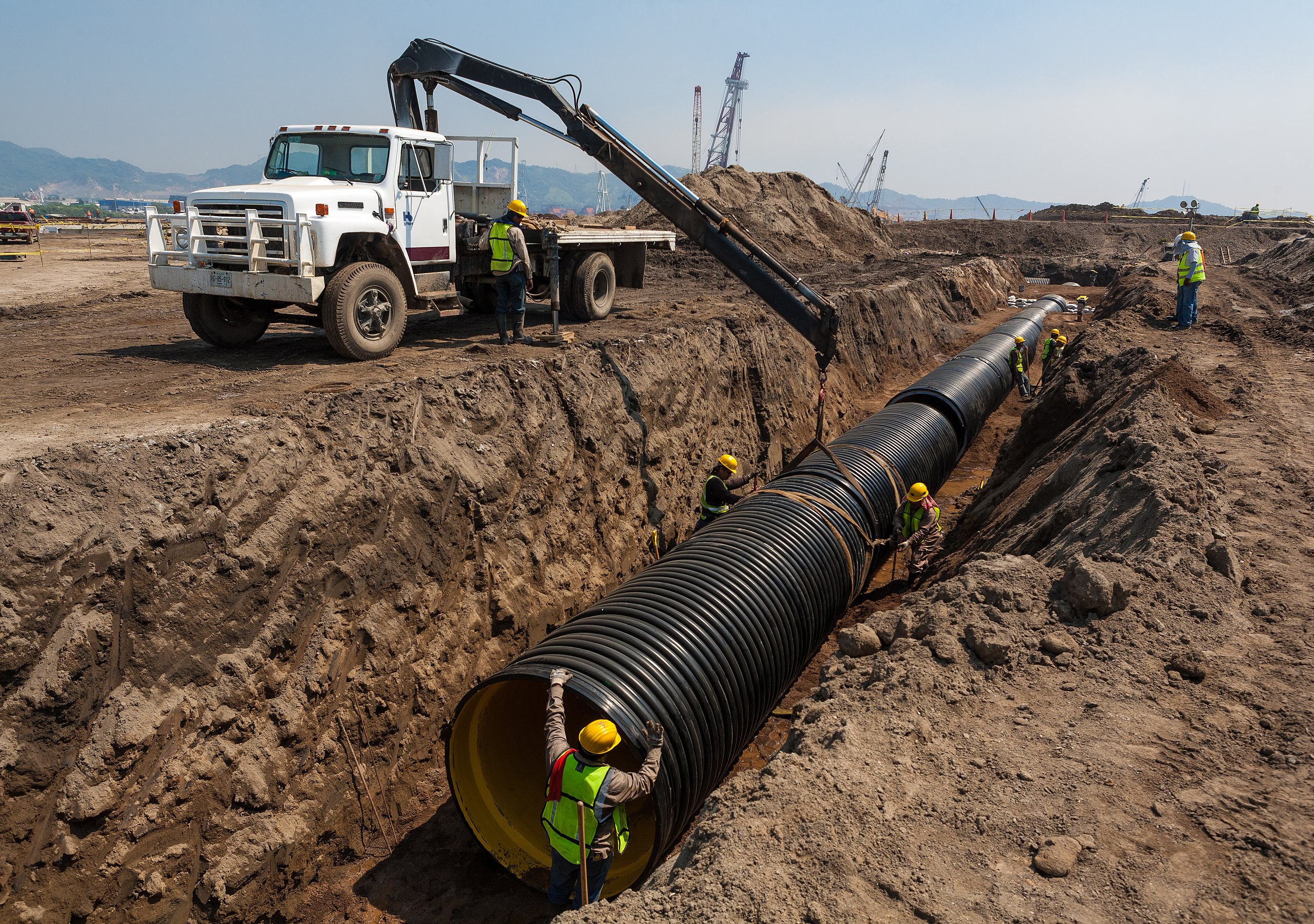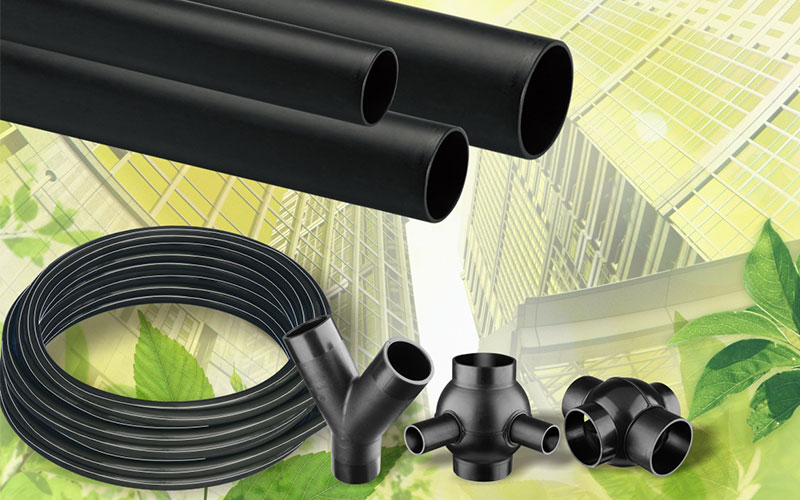How American Plastics HDPE Pipe for Oilfield Supports Energy Infrastructure
Wiki Article
Comprehending the Trick Conveniences of HDPE Pipe for Water and Wastewater Administration
Using HDPE pipe in water and wastewater administration presents numerous benefits that warrant consideration. Its exceptional durability and lengthy lifespan make it a recommended selection for several projects. Furthermore, the material's resistance to corrosion and chemical damages boosts its integrity in different settings. The benefits expand beyond simply longevity and resistance. Pipe Manufacturing Midland TX. Discovering its cost-effectiveness and ecological influence exposes a lot more compelling reasons for its widespread adoption in modern-day infrastructureRemarkable Toughness and Longevity

HDPE pipeline stands out for its remarkable toughness and long life, making it a recommended option in water monitoring systems. Built from high-density polyethylene, these pipelines can hold up against substantial stress and stress, making sure trusted efficiency in time. Their robust nature permits them to endure severe environmental conditions, consisting of temperature variations and soil activities, which can create various other products to stop working.
The lifespan of HDPE pipes usually exceeds half a century, offering a cost-effective solution for districts and industries alike. Furthermore, the material's light-weight homes streamline installment, decreasing labor expenses and durations. This longevity lessens the requirement for regular repair services or replacements, even more boosting its economic allure.
In water monitoring applications, the reliability of HDPE pipelines implies less interruptions and improved service connection, making them indispensable to lasting facilities development. The mix of resilience and longevity solidifies HDPE's role as a cornerstone in effective water management options.

Resistance to Deterioration and Chemical Damages
While lots of products succumb to deterioration and chemical damage over time, HDPE pipes display exceptional resistance, making them excellent for different water monitoring applications. This durability originates from the molecular structure of high-density polyethylene, which is inherently non-reactive and does not rust like steels or deteriorate from direct exposure to harsh chemicals. As a result, HDPE is highly reliable in settings with hostile substances, such as wastewater systems that might have acids, bases, and natural solvents.
In addition, HDPE pipes can stand up to ecological variables such as soil level of acidity and saline conditions, even more enhancing their suitability for diverse applications (Texas hdpe pipe manufacturer). Their capability to keep architectural integrity in time decreases the danger of leaks and failings, which is essential in making sure the security and reliability of water distribution and wastewater management systems. The resistance to rust and chemical damages noticeably contributes to the overall efficiency and durability of HDPE piping services.
Cost-Effectiveness and Economic Advantages
When taking into consideration the financial effects of water administration systems, the cost-effectiveness of HDPE pipelines comes to be apparent. These pipelines use lower installation and upkeep costs contrasted to conventional materials like steel or concrete. Their lightweight nature simplifies transport and installment, leading to lowered labor expenses. In addition, HDPE pipelines show a lengthy life-span, usually surpassing half a century, which equates to fewer substitutes and lasting savings.The resistance of HDPE to corrosion and chemical damage reduces the need for expensive repairs and substitutes. The pipelines also sustain reliable water circulation, minimizing power prices connected with pumping systems. By alleviating leaks and water loss, HDPE pipes contribute to substantial economic benefits for communities and sectors alike. On the whole, the initial financial investment in HDPE piping can produce significant monetary returns over the life-span of the water management system, making it a sensible selection for sustainable framework growth.
Environmental Sustainability and Lowered Effect

Convenience and Adaptability in Setup
Due to their distinct buildings, HDPE pipes provide exceptional flexibility and flexibility in installment, making them appropriate for a large range of applications. Their lightweight nature permits easier handling and transportation, reducing labor prices and setup time. HDPE pipes can be curved and shaped to fit different terrains and job requirements, which is particularly beneficial in testing settings.Furthermore, their resistance to corrosion and chemical damage enables setup in varied setups without the demand for specialized protective layers. The ability to fuse joints creates a constant, leak-free system, boosting more info the overall integrity and dependability of the installment. HDPE's adaptability also suits ground motion, minimizing the threat of damages in locations susceptible to changing soil. In general, these characteristics make HDPE pipelines not only versatile yet additionally a preferred option for water and wastewater administration systems.
Regularly Asked Questions
Exactly How Does HDPE Pipe Contrast to PVC in Water Management Applications?
HDPE pipe supplies exceptional adaptability, resistance to corrosion, and sturdiness contrasted to PVC. Its lighter weight assists in less complicated setup, while its lengthy life-span lowers substitute prices, making HDPE a preferred choice in water monitoring applications.What Is the Life Expectancy of HDPE Water Lines Under Common Conditions?
Under common conditions, HDPE pipelines can have a life expectancy varying from 50 to 100 years. Their sturdiness and resistance to rust add to their long-term performance in various applications, making them a reliable option for infrastructure.Are HDPE Pipeline Recyclable After Their Life Span?
Yes, HDPE pipes are recyclable after their solution life. Pipe Supplier American Plastics Midland. They can be processed and repurposed right into brand-new items, substantially reducing ecological influence and promoting sustainability within the market, making them a green choice for piping optionsWhat Is the Setup Refine for HDPE Piping?
The installment procedure for HDPE pipes entails website preparation, trenching, pipeline combination or mechanical joining, backfilling, and pressure screening. Proper techniques assure a long lasting and reliable system for carrying water and wastewater successfully.Can HDPE Piping Be Utilized for Both Safe And Clean and Non-Potable Water Solutions?
Yes, HDPE pipelines can be made use of for both safe and clean and non-potable water supply. Their flexibility, durability, and resistance to rust make them appropriate for different applications, making certain secure and reliable transportation of water in various contexts.Report this wiki page